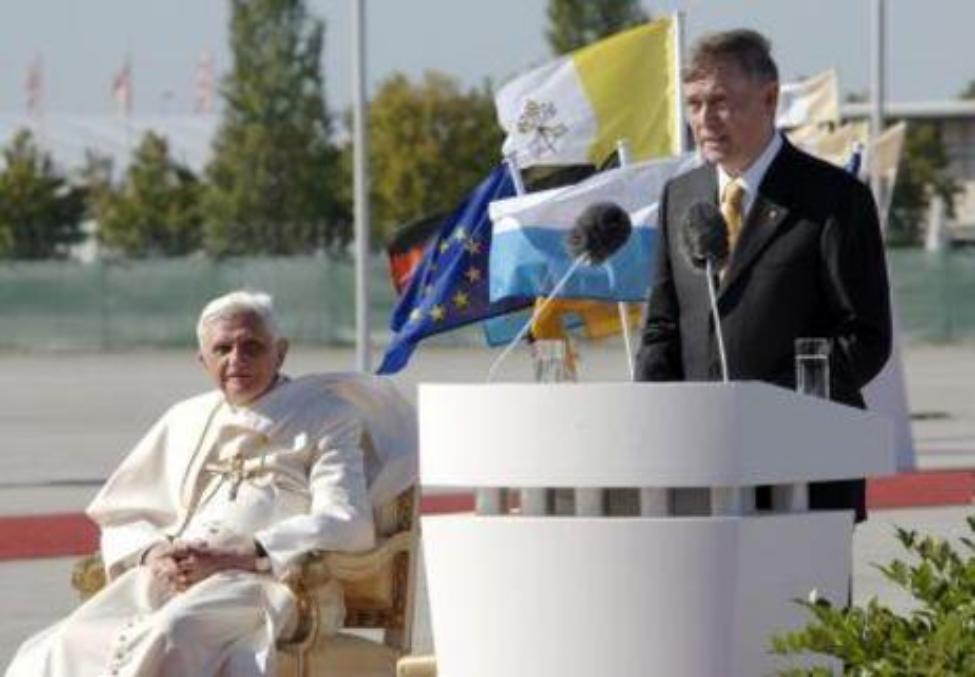Welcome home, Welcome to Germany!
We are delighted to greet you here once again.
Holy Father, it was your particular wish that the visit you are commencing today should allow you to return to the places you regard as home - Marktl, your birthplace, Munich, your former bishopric, your alma mater in Regensburg. You will meet your brother and visit your parents' grave. I find it rather moving that the "Pastor of the universal Church", as one of your titles describes you, remains so true to his background and his home.
We are all shaped by our background and our home. Home is more than just a specific environment, home represents a way of life, customs, music and literature, home represents convictions, it represents a quite unique kind of existence in the world. And home also encompasses personal relationships, friends, comrades, family members and especially brothers, sisters and parents, of course. When we say we have a home, we are also saying that we are not merely the product of our own efforts and achievements. We owe what we are to something and someone else. When we say we have a home, we also acknowledge our limitations and pay homage to a specific form which has shaped our lives.
And yet time and again people are forced to leave their homes. Many due to war and expulsion, but many others also because they no longer have any livelihood or means of survival where they come from and have to try and start afresh in foreign climes.
Today, therefore, nations, cultures and religions are intermingling more than ever before. For this process to occur peacefully, mutual respect and consideration for one another is more crucial than ever. Peaceful coexistence will only become a reality if everyone is able to enjoy an equal share of the fruits of the earth. You, Holy Father, developed these thoughts further on the basis of Catholic social teaching in your Encyclical. Your ideas on this issue will strike a chord with all people of good will.
Holy Father, many scenes from World Youth Day have remained in my mind. The days you spent in Cologne produced deep waves which are still having a tangible impact. Allow me to repeat and reinforce what I said in my welcome to you on that occasion: Germany's churches harbour a tremendous force and energy which enrich our entire country and our whole society. This applies particularly to youth work, in which so many young people voluntarily invest their time to help others, inspired by a firm conviction. This commitment helps them to find a salutary focus for their lives which they can then pass on. It is important to me to tell you once again in person how grateful I am that this is the case.
Holy Father, only very shortly after World Youth Day I participated in the requiem for the murdered Brother Roger in Taizé, whom you, too, regarded very highly. Attending this ceremony meant a great deal to me. The prevailing ecumenical atmosphere and ecumenical spirit there impressed me deeply. And the fact that a Cardinal from the Vatican, Walter Kasper, celebrated the service, was, for me, a sign of hope. Holy Father, in Germany particularly, the country which saw the birth of the Reformation, many Christians long for ecumenical understanding and - if we can put it in such simple terms - ecumenical progress.
I know that it is not possible simply to undo almost 500 years of divergent development in theology and faith practices with a stroke of the pen, and I am mindful that the churches have drawn much closer together particularly in the last 50 years. Nonetheless, allow me as a Protestant to express my hope that this ecumenical development will continue, above all in a spirit of mutual respect and in recognition of our profound common ground in significant areas. That which unites us is so much greater than that which divides us.
Holy Father, men and women from all regions of the earth come to St Peter's Square in Rome to listen to your interpretation of doctrine. This overwhelming response reflects the level of trust and confidence people place in you. And even if they are unable to follow your thinking or feel they have to contradict you, they do so with great respect for the wisdom and authority of your words and your thought.
In your first Encyclical, and elsewhere, you have spoken of faith as a positive option, as a great opportunity, as an invitation. "Deus caritas est" - God is love - was the subject of your first message to the world. I understand that also as an urgent appeal to all religions and denominations to reflect on and evaluate their own attitudes. When religion and faith are exploited for ignoble ends, something is wrong. And when they are actually used as a justification for war, terrorism and planned murder, then everything is utterly wrong.
Holy Father, ever since you assumed office you have stood up against such abuse of religion, which can ultimately bring any form of religious conviction into disrepute, not only with passionate appeals, but also with theological determination and intellectual acumen. I sincerely hope that increasing numbers of people will be open to your message and that it will take root in hearts and minds throughout the world.
We want this planet Earth, this one world, to be a good home for all of us, wherever we live.
Nonetheless, allow me, Holy Father, here, today, on behalf of all Germans, to welcome you once again to your home.
Welcome to Munich, Welcome to Bavaria, Welcome to Germany!


